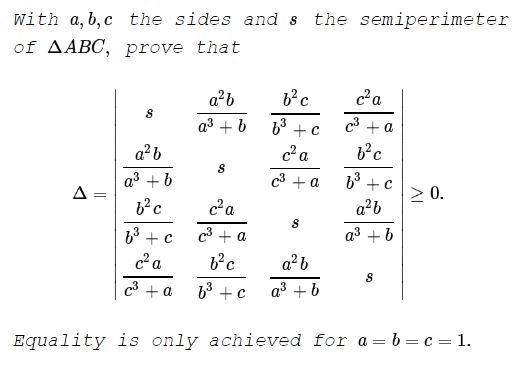An Inequality with Determinants V
Problem

Lemma
For $x,y,z,t\in\mathbb{R},$
$\displaystyle\begin{align} \Delta' &=\left|\begin{array}{cccc} \,x & y & z & t\\ y & x & t & z\\ z & t & x & y\\ t & z & y & x\end{array}\right|\\ &=(x+y+z+t)(x-y+z-t)(x+y-z-t)(x-y-z+t). \end{align}$
Proof 1 of Lemma
We shall compute the determinant first using row and/or column operations, describing each step symbolically next to the determinant the operation applied to:
$\displaystyle\begin{align} \Delta' &=\left|\begin{array}{cccc} \,x & y & z & t\\ y & x & t & z\\ z & t & x & y\\ t & z & y & x\end{array}\right|^{(r_1\,=:\,r_1+r_2+r_3+r_4)}\\ &=(x+y+z+t)\left|\begin{array}{cccc} \,1 & 1 & 1 & 1\\ y & x & t & z\\ z & t & x & y\\ t & z & y & x\end{array}\right|^{(c_4\,=:\,c_4-c_3+c_2-c_1)}\\ &=(x+y+z+t)(x-y+z-t)\left|\begin{array}{cccc} \,1 & 1 & 1 & 0\\ y & x & t & 1\\ z & t & x & -1\\ t & z & y & 1\end{array}\right|^{(c_2\,=:\,c_2-c_1,\, c_3\,=:\,c_3-c_1)}\\ &=(x+y+z+t)(x-y+z-t)\left|\begin{array}{cccc} \,1 & 0 & 0 & 0\\ y & x-y & t-y & 1\\ z & t-z & x-z & -1\\ t & z-t & y-t & 1\end{array}\right|\\ &=(x+y+z+t)(x-y+z-t)\left|\begin{array}{ccc} x-y & t-y & 1\\ t-z & x-z & -1\\ z-t & y-t & 1\end{array}\right|^{(r_1\,=:\,r_1+r_2,\, r_3\,=:\,r_3+r_2)}\\ &=(x+y+z+t)(x-y+z-t)\left|\begin{array}{ccc} x-y+t-z & x-y+t-z & 0\\ t-z & x-z & -1\\ 0 & x+y-z-t & 0\end{array}\right|\\ &=(x+y+z+t)(x-y+z-t)\left|\begin{array}{cc} x-y+t-z & x-y+t-z\\ 0 & x+y-z-t\end{array}\right|\\ &=(x+y+z+t)(x-y+z-t)(x-y+t-z)(x+y-z-t). \end{align}$
Proof 2 of Lemma
Note that the matrix in the lemma is defined blockwise, say:
$\displaystyle S= \left(\begin{array}{cccc} \,x & y & z & t\\ y & x & t & z\\ z & t & x & y\\ t & z & y & x\end{array}\right)= \left(\begin{array}{cc}\,A & B\\B & A\end{array}\right),$
where $A=\left(\begin{array}{cc}\,x & y\\y & x\end{array}\right)\,$ and $B=\left(\begin{array}{cc}\,t & z\\z & t\end{array}\right).\,$ It is easily verifiable that the matrices commute: $AB=BA,\,$ which allows for an application of Silvester's theorem, concerning the determinants of block-matrices. In our case,
$\begin{align} \det(S) &=\det(A^2-B^2)\\ &=(x^2+y^2-t^2-z^2)^2-[2(xy-tz)]^2\\ &=(x^2+y^2-t^2-z^2-2xy+2tz)(x^2+y^2-t^2-z^2+2xy-2tz)\\ &=((x-y)^2-(t-z)^2)((x+y)^2-(t+z)^2) \end{align}$
which is exactly the same expession as above.
Reference
- John R. Silvester, Determinants of Block Matrices, The Mathematical Gazette, Vol. 84, No. 501 (Nov., 2000), pp. 460-467
Solution
In the problem, let $\displaystyle x=s,\,$ $\displaystyle y=\frac{a^2b}{a^3+b},\,$ $\displaystyle z=\frac{b^2c}{b^3+c},\,$ $\displaystyle t=\frac{c^2a}{c^3+a}.\,$ We have, for example, by the AM-GM inequality,
$\displaystyle\begin{align} \frac{a^2b}{a^3+b} &\le \frac{a^2b}{2a\sqrt{ab}}=\frac{ab}{2\sqrt{ab}}=\frac{\sqrt{ab}}{2}\\ &=\frac{a+b}{4}. \end{align}$
For equality, we need $a^3=b\,$ and also $a=b,\,$ with the only feasible solution $a=b=1.$
Similarly to the above, $\displaystyle\frac{b^2c}{b^3+c}\le\frac{b+c}{4}\,$ and $\displaystyle\frac{c^2a}{c^3+a}\le\frac{c+a}{4}.\,$ From these we conclude that $y+z+t\le x\,$ which guarantees that all four factors in Lemma are non-negative, making $\Delta'\ge 0\,$ and also $\Delta\ge 0.\,$ The equality in $y+z+t\le x\,$ is achieved when $a=b=c=1.\,$ Otherwise, $\Delta\gt 0.$
Acknowledgment
The inequality from the Romanian Mathematical Magazine has been shared at the CutTheKnotMath facebook page by Dan Sitaru. The problem and the solution above are due to Dan Sitaru and Leo Giugiuc. I reproduce that part here because of a lemma of a general character, interesting in its own right. The article gives another solution due to Soumava Chakraborty (India).
[an error occurred while processing this directive]
|Contact| |Front page| |Contents| |Algebra|
Copyright © 1996-2018 Alexander Bogomolny